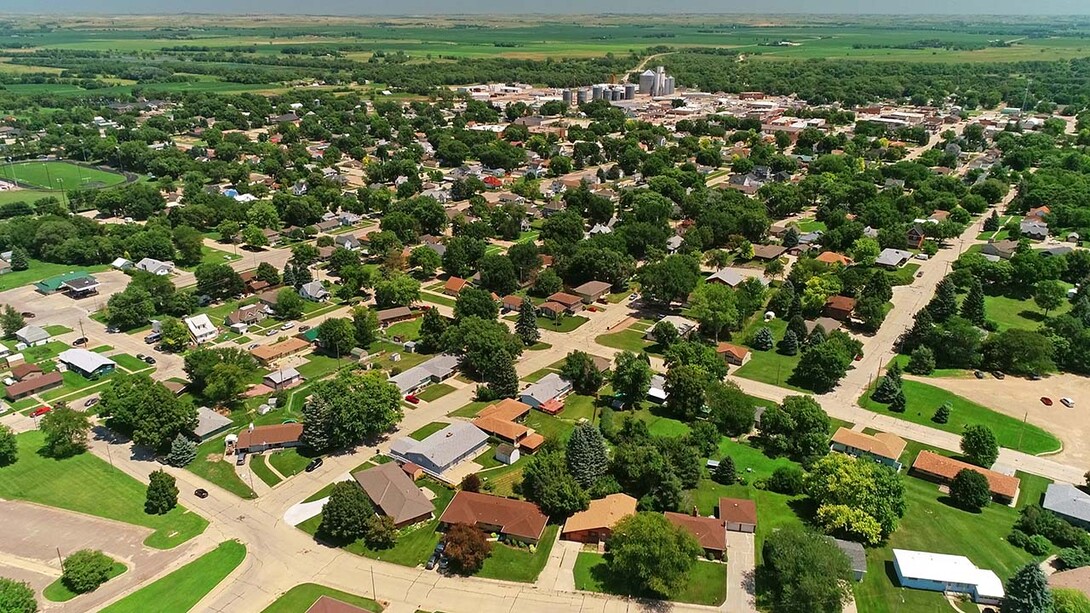
The University of Nebraska is uniting two entities committed to the success of the state’s rural communities with the launch of Rural Prosperity Nebraska.
The launch of the program follows NU President Ted Carter’s announcement of rural community development and vitality as one of five areas of strength where NU is well positioned to be a world leader. Carter made the announcement during the NU Board of Regents meeting Aug. 14 as he introduced the university’s new strategic action plan. Other areas of strength highlighted in the plan include food security, infectious disease, national and cyber security and early childhood education.
Housed in the University of Nebraska–Lincoln’s Institute of Agriculture and Natural Resources, Rural Prosperity Nebraska brings together Nebraska Extension’s statewide team of Community Vitality Initiative educators with NU’s Rural Futures Institute, which was launched in 2012 to facilitate scholarship in service to the success of rural people, leaders and communities.
Merging these two programs will allow NU to be more strategic, focused and holistic in engaging with Nebraska’s rural community leaders to advance their communities in ways that are important to them, including attracting and retaining young families, developing the next generation of leaders, supporting businesses and entrepreneurs, and ensuring they have the infrastructure and services needed to grow and thrive.
“With the launch of Rural Prosperity Nebraska, we are doubling down on our commitment to rural community development and prosperity,” said Mike Boehm, NU vice president for agriculture and natural resources and IANR Harlan Vice Chancellor at Nebraska. “Both NU’s Rural Futures Institute and Nebraska Extension’s Community Vitality Initiative made big impacts, and this shift should allow us to be a more effective and better partner by uniting the best we have to offer under the Rural Prosperity Nebraska umbrella.”
The popular RFI Fellows program, in which college students from across Nebraska complete 10-week service-learning projects in communities throughout the state each summer, will be retained and expanded under the new program. So, too, will the Thriving Index, an economic and quality-of-life benchmarking tool that allows rural regions of Nebraska to see how they compare to similar regions across the state and the upper Midwest.
The Nebraska Rural Poll also will be associated with Rural Prosperity Nebraska. The Rural Poll is an annual survey that for the past 25 years has provided a platform for the state’s rural residents to share their thoughts and opinions on important statewide issues.
Under Rural Prosperity Nebraska, extension educators dedicated to rural community prosperity and success across the state will focus their work in six areas: entrepreneurship and economic diversification; placemaking; people attraction and retention; leadership and community capacity building; regional food systems; and community engagement and accountability.
Growing existing relationships and building new partnerships with local, regional and state leaders will be key to extension’s success in these areas, said Dave Varner, interim dean and director of Nebraska Extension.
“Extension is most effective when our educators and specialists work closely and co-create solutions with local leaders,” Varner said. “The best ideas to improve rural communities always come from the people who live there. Extension can help facilitate robust conversations that spark innovation, then connect rural residents with grants, trainings and other resources that help get the job done.”
Varner will work closely with Boehm to advance Rural Prosperity Nebraska until a permanent director is hired via a national search. Mark Balschweid, former interim director of the Rural Futures Institute and head of Nebraska’s Department of Agricultural Leadership, Education and Communication, will identify and work with faculty members from across NU’s four campuses who are conducting research or are interested in beginning projects focused on rural issues. Faculty members who are doing work in this space are encouraged to contact Balschweid at 402-472-8738 or mbalschweid2@unl.edu.
Cheryl Burkhart-Kriesel, an extension professor based in Scottsbluff, will lead the extension team working in the six focus areas. Burkhart-Kriesel has more than 30 years’ experience in higher education, extension and community development. Her current research interests include demographic renewal and economic opportunities.
“Supporting communities where they are to help them be their best is absolutely critical for the future success of both rural and urban areas of our state,” Burkhart-Kriesel said. “As a university, we can drive success by connecting students to community issues, by using our research skills to help better understand ourselves and our changing environments, and in countless other ways.”







